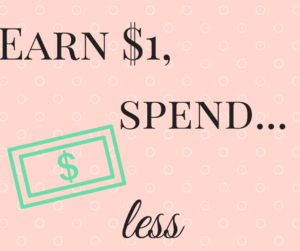
Money. People often have a love/hate relationship with money—they love it when they have it, and hate it when they don’t. As people of faith, we are taught from Scripture that the love of money is the root of all evil. In Proverbs, the wise are encouraged to desire neither poverty nor riches (Proverbs 30:8). Craig Blomberg wrote a fantastic book on the theology of money by this title if you’re interested in a little light reading. 😉
While it’s clear that we need to keep a healthy view of money, what does that really look like?
We can’t simply ignore it; we need it for our basic needs, and we need it to gain the things we ‘want.’
Perhaps your desire isn’t to be rich, but to have ‘enough.’ ‘Enough’ has as many definitions as there are people.
I’ve been following a woman with a finance blog called Afford Anything and her main mantra is that we can afford anything, just not everything.
We all make choices with our money. She argues that it isn’t necessarily that we “can’t afford” something, but the truth is we’re choosing not to afford one thing in lieu of another.
While I think that Starbucks is wildly overpriced and I don’t choose to get drinks there without a gift card, it’s more honest to say that I don’t choose to afford it rather than ‘I can’t afford it.’ I choose, rather, to buy a bag of Peet’s coffee for $6.98 that lasts the two of us about three weeks or so of our daily morning joe. My husband and I couldn’t even both get drinks one time at Starbucks for the same price that we drink coffee every day for three weeks. Honestly, Peet’s coffee is better anyway. But I digress…
We can afford anything, not just everything.
It all depends on the value we place on the things we want.
I have always been a saver. I’d say I’m frugal almost to a fault at times. I have tried in recent years to loosen the grip on cashflow so that I don’t feel like I live in a constant state of feeling like there’s never enough when in reality, there always has been.
We’ve been incredibly blessed financially and I’ve been able to save at a level I’m comfortable with. In my younger years, I operated in a save-every-last-penny-if-at-all-possible sort of way, but marriage and kids means that I’ve had to accept that we do have to spend some money to eat and live.
Although I’ve always been a saver, I can’t say that I’ve ever had defined financial goals beyond simply “save”—because that’s what you’re supposed to do.
In addition to Afford Anything, I’ve been reading up on the Money Boss; his stuff is awesome and I’d highly recommend joining his email list. In one of his emails he encouraged readers to set tangible financial goals. He uses a formula to have you calculate the amount of money you’d need to be financially independent, and then work backwards to see what amount you’d need to be putting into savings, retirement, etc. It was fascinating. Once you work backwards, you can see if you’re stashing away enough each month to reach your goals.
Again, I had always operated under the mentality of just save as much as possible, rather than saving for a defined goal.
Maybe you’ve done all this and have a budget and are right on target and content with your financial status. Most people I talk to, however, admit that money is a problem at times and that saving is difficult, but that they want to take steps to improve.
Deciding to do something is the first step. What to actually do could be a bit more challenging. If you’re interested, here are a few easy things that you can do today:
- Read some financial blogs (Afford Anything, Money Boss, Mad Fientist, etc) to learn something new.
- Open an online savings account with a higher APY than your current bank. Most regular banks have a savings account APY of .01%. Online accounts like Dollar Savings Direct and Aspiration have APY of 1-1.3%. It doesn’t seem like that big of a difference, but when your savings grows and that number compounds, it can really make a difference.
- Research investment accounts. I personally chose Vanguard, but do your research and figure out one you’re comfortable with and start saving, even if it’s just a small amount to begin with. A small amount is better than nothing, and with time it will grow, and the more time, the better.
- Download a budget app if you don’t already use one (Every Dollar is free from Dave Ramsey, or a lot of people love Mint).
- Write down some financial goals.
- Think about what you value most and be mindful in your spending on things that aren’t as important to you.
You don’t have to love money to have an understanding of its necessity and a desire to spend it or save it wisely. Money matters—we certainly don’t want it to control us, but we do want to utilize it to take care of our needs, and sometimes even our wants. 😉
Wherever you’re at, be wise with that which has been given to you.
